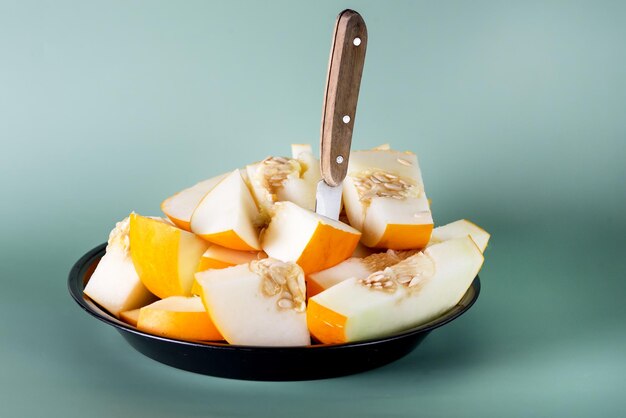Can Cantaloupes Ripen in the Refrigerator? A Complete Guide on Storing and Ripening Your Favorite Melon 🍈
In the colorful world of fruits, cantaloupes stand out as a beloved and nutritious choice, enticing us with their sweet aroma and refreshing taste. But when you've snagged a cantaloupe from the store that's not quite ripe, the question arises: Can a cantaloupe ripen in the refrigerator? This common query leads us on a journey through the ripening stages of cantaloupes, the science behind fruit storage, and practical tips for preserving their flavor and texture. Let's dive into this juicy topic and explore how to get the best out of your cantaloupe experience.
Understanding Cantaloupe Ripening
The Ripening Process
Cantaloupes, like many other fruits, undergo a natural ripening process where their sugars develop, enhancing their sweetness and aroma. This process is driven by natural plant hormones called ethylene, which helps fruits transition from underripe to ripe, making them softer and more flavorful.
Ethylene: The Ripening Agent
Cantaloupes are climacteric fruits, meaning they continue to ripen after being harvested. The production and response to ethylene gas increase after harvest, contributing to further softening and sugar accumulation. Unlike non-climacteric fruits, which do not ripen once picked, cantaloupes have the potential to improve after purchase, but this doesn't necessarily mean the refrigerator is the best place for this.
Storing Cantaloupes: Refrigerator vs. Room Temperature
Room Temperature Storage
For a cantaloupe to ripen optimally, room temperature is key. Allowing them to sit on the kitchen counter enables them to release and be exposed to ethylene gas, accelerating the ripening process. This environment mimics natural conditions that facilitate ripening in a way that's beneficial to flavor and texture development.
👉 Tips for ripening cantaloupes at room temperature:
- Place the cantaloupe in a ventilated bag or breathable fruit bowl to allow for ethylene exposure.
- Check the fruit daily for ripeness by gently pressing the top (opposite the stem); it should yield slightly when ripe.
- Once ripe, consider transferring it to the refrigerator to extend freshness for a few additional days.
Refrigerator Storage
Refrigerating a cantaloupe hinders the natural ripening process. The cool temperature slows down ethylene production and action, which is essential for full ripening. Therefore, placing an unripe cantaloupe in the fridge may halt or significantly prolong its journey to ripeness.
👉 Tips for storing ripe cantaloupes in the refrigerator:
- If your cantaloupe is already ripe, refrigeration is suitable to maintain its freshness.
- Store the fruit whole in the refrigerator to preserve its moisture and flavor for up to a week.
- If cut, wrap it tightly in plastic wrap or store it in an airtight container to prevent drying and flavor absorption from other foods.
How to Tell If a Cantaloupe is Ripe
Visual and Tactile Cues
Identifying a ripe cantaloupe involves a few sensory checks:
- Appearance: Look for a cantaloupe with a golden undertone beneath the netted skin pattern.
- Touch: The end opposite the stem should have some give when pressed gently.
- Smell: A sweet, musky aroma is a good indication that the cantaloupe is ripe and ready to eat.
Common Mistakes in Ripening Cantaloupes
Avoid placing a cantaloupe in a sealed bag for extended periods, as the buildup of carbon dioxide can spoil the fruit. Ensure proper ventilation during room-temperature ripening to ensure the best results.
Maximizing Flavor: Pairing and Enjoyment
Culinary Uses for Ripe Cantaloupe
Once you've achieved the perfect ripeness, cantaloupes offer versatile culinary possibilities. Enjoy them:
- Fresh: As a refreshing snack or in fruit salads.
- Desserts: In sorbets, smoothies, or with a drizzle of honey.
- Savory Pairings: Wrapped in prosciutto or added to salads with herbs and cheeses.
Nutritional Benefits
Besides their delightful taste, cantaloupes are nutritious, providing:
- Vitamins: High in vitamins A and C.
- Hydration: With high water content, they aid in hydration.
- Low Calories: Make them a guilt-free treat.
Summary and Key Takeaways 📋
Here's a quick visual rundown to help you master the art of cantaloupe storage and ripening:
- 🔥 Best Ripening Spot: Keep at room temperature until ripe.
- ❄️ Post-Ripening Storage: Place in the refrigerator only once ripe to prolong freshness.
- ❌ No Ripening in Fridge: Cooler temperatures halt the ripening process.
- 👃🏻 Sensory Checks: Ripe when aromatic, slightly soft at the end opposite the stem, and golden-hued under the netting.
Navigating the balance between ripening and preserving cantaloupes enhances their taste and texture, ensuring you enjoy the wholesome sweetness of this marvelous melon. Now, with these insights, you're equipped to savor every bite of your cantaloupe regardless of the season. So next time you're in the fruit aisle, pick a cantaloupe with confidence and enjoy the burst of summer in every slice. 🍈

